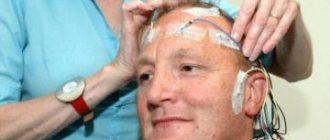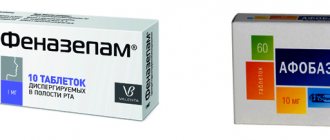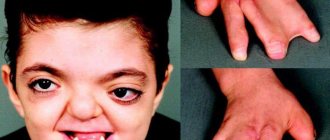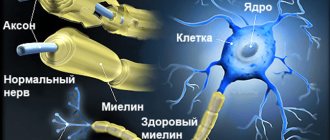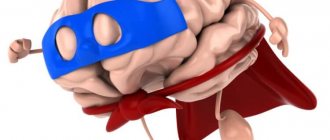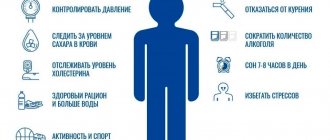Trittico
Use during pregnancy and breastfeeding
The drug is contraindicated for use during pregnancy and lactation (breastfeeding).
Use for liver dysfunction
The drug should be prescribed with caution to patients with liver failure.
Use for renal impairment
The drug should be prescribed with caution to patients with renal failure.
Use in children
The use of the drug in children and adolescents under 18 years of age is contraindicated (the safety of trazodone for children has not been established).
Use in elderly patients
For elderly and debilitated patients, the initial dose is up to 100 mg/day in fractional doses or 1 time/day before bedtime. The dose may be increased under medical supervision, depending on the effectiveness and tolerability of the drug. Usually no dose exceeding 300 mg/day is required.
special instructions
People with depression have an increased risk of suicidal thoughts, self-harm, or suicide. The risk may last until significant remission occurs. Since improvement may not occur for the first few weeks of treatment or more, patients should be closely monitored until such improvement occurs. It is common clinical experience that the risk of suicide may increase in the early stages of recovery. It is known that patients with a history of suicidal events, or patients who exhibit a significant degree of suicidal ideation even before treatment, have a higher risk of suicidal ideation or suicide attempts, and should be closely monitored during treatment. The results of a meta-analysis of placebo-controlled clinical trials of antidepressants used in adults with mental disorders showed an increased risk of suicidal behavior in patients under the age of 24 years while taking antidepressants compared with placebo. Careful monitoring of patients, especially those at high risk, should accompany drug therapy, especially in its early stages and after dose changes. Patients (and their caregivers) should be warned to monitor for any clinical deterioration, suicidal behavior or thoughts, or unusual changes in behavior, and to immediately seek professional advice if such symptoms occur.
Since the drug has some adrenergic blocking activity, bradycardia and a decrease in blood pressure may develop. Therefore, caution should be exercised when prescribing the drug to patients with a tendency to prolong the QT interval, AV block of varying severity, and patients with a recent myocardial infarction.
When treated with trazodone in patients with bipolar disorder, depressive episodes can range from manic-depressive to manic psychosis. In these cases, it is necessary to interrupt treatment.
If you have epilepsy, use trazodone with caution, in particular avoiding sudden increases or decreases in dose.
With simultaneous use of trazodone with drugs that have serotonergic activity (tricyclic antidepressants, selective serotonin reuptake inhibitors, norepinephrine and serotonin reuptake inhibitors and MAO inhibitors) and antipsychotics, serotonin syndrome may occur.
When trazodone is used simultaneously with drugs containing St. John's wort, side effects may be more frequent.
When using trazodone, agranulocytosis may develop, so it is recommended to conduct peripheral blood tests, especially if there is a sore throat when swallowing and fever.
Trazodone is effective for sleep disorders in patients with depression, increases the depth and duration of sleep, and restores its physiological structure and quality.
The use of the drug does not affect body weight.
The drug is not addictive.
Impact on the ability to drive vehicles and operate machinery
During the period of use of the drug, care must be taken when driving vehicles and engaging in other potentially hazardous activities that require increased concentration and speed of psychomotor reactions.
Trittico 150 mg 20 pcs. tablets aziende chimiche riunite angelini france
pharmachologic effect
Antidepressant.
Composition and release form Trittiko 150 mg 20 pcs. tablets aziende chimiche riunite angelini france
Tablets - 1 tablet:
- Active ingredient: trazodone hydrochloride 150.0 mg;
- Excipients: sucrose 84.0 mg; carnauba wax 24.0 mg; povidone 24.0 mg; magnesium stearate 6.0 mg.
10 tablets in a PVC/aluminum foil blister.
2 or 6 blisters along with instructions for use in a cardboard box.
Description of the dosage form
Biconvex tablets, white or white with a yellowish tint, oval in color with two parallel lines on both sides.
Characteristic
Triazolopyridine derivative.
Directions for use and doses
Tablets should be taken orally 30 minutes before meals or 2 to 4 hours after meals. The tablets should be taken whole, without chewing, and with plenty of water.
Initial dose of the drug: 100 mg, taken once before bed after meals. On the 4th day you can increase the dose to 150 mg. Further increases in the dose in order to achieve the optimal therapeutic effect should be made by 50 mg/day every 3-4 days until the optimal dose is reached. A daily dose of more than 150 mg should be divided into 2 doses, with the smaller dose taken after lunch and the main dose before bed.
The maximum daily dose for outpatients is 450 mg.
Maximum daily dose for inpatients. 600 mg.
For elderly and debilitated patients, the initial dose is up to 100 mg/day in divided doses or once before bedtime. It can be increased under medical supervision, depending on the effectiveness and tolerability of the drug. A dose exceeding 300 mg/day is usually not required.
Pharmacodynamics
Pharmacodynamics: trazodone inhibits neuronal reuptake of serotonin, is an antagonist of 5-HT2A/2c-serotonin receptors and an α1-adrenergic receptor blocker and has an antidepressant effect.
Pharmacokinetics
Absorption of trazodone from the gastrointestinal tract after oral administration is high. Taking trazodone during or immediately after a meal slows the rate of absorption, reduces the maximum plasma concentration of trazodone, and increases the time to reach maximum concentration (TCmax).
TCmax is achieved 1/2-2 hours after oral administration.
Trazodone penetrates through histohematic barriers into tissues and fluids (bile, saliva, breast milk).
Communication with plasma proteins is 89 - 95%.
Trazodone is metabolized in the liver, the active metabolite is 1-m-chlorophenylpiperazine. The half-life is 3-6 hours, in the second phase 5-9 hours. Elimination of most of the metabolized trazodone is carried out by the kidneys with urine - about 75%, and is completely completed 98 hours after administration; About 20% is administered with bile. In vitro studies on human microsomes have shown that trazodone is primarily metabolized by the cytochrome P450 isoenzyme (CYP3A4 isoenzyme).
Indications for use Trittico 150 mg 20 pcs. tablets aziende chimiche riunite angelini france
Depression with or without anxiety.
Contraindications
- Hypersensitivity to the active substance or any excipient;
- pregnancy period;
- lactation period;
- alcohol intoxication and intoxication with sleeping pills;
- The safety of trazodone for children under 18 years of age has not been established, therefore the use of the drug in children and adolescents is not recommended;
- sucrase/isomaltase deficiency, fructose intolerance, glucose-galactose malabsorption, since the drug contains sucrose.
With caution: the drug should be prescribed with caution to patients with AV block, myocardial infarction (early recovery period), arterial hypertension (dose adjustment of antihypertensive drugs may be required), ventricular arrhythmia, a history of priapism, and renal and/or liver failure.
Application of Trittico 150 mg 20 pcs. tablets aziende chimiche riunite angelini france during pregnancy and breastfeeding
The drug is not recommended for use by pregnant women. The drug is not recommended for use during breastfeeding.
special instructions
Suicide/suicidal ideation or worsening clinical symptoms: Depressive conditions have an increased risk of suicidal ideation, self-harm, or suicide. The risk may last until significant remission occurs. Since improvement may not occur for the first few weeks of treatment or more, patients should be closely monitored until such improvement occurs. It is common clinical experience that the risk of suicide may increase in the early stages of recovery. It is known that patients with a history of suicidal events, or patients who exhibit a significant degree of suicidal ideation even before treatment, have a higher risk of suicidal ideation or suicide attempts, and should be closely monitored during treatment. A meta-analysis of placebo-controlled clinical trials of antidepressants used in adults with mental disorders showed an increased risk of suicidal behavior in patients under 24 years of age when taking antidepressants compared with placebo. Careful monitoring of patients, especially those at high risk, should accompany drug therapy, especially in its early stages and after dose changes. Patients (and their caregivers) should be warned to monitor for any clinical deterioration, suicidal behavior or thoughts, or unusual changes in behavior, and to immediately seek professional advice if such symptoms occur.
Since the drug has some adrenergic blocking activity, bradycardia and a decrease in blood pressure may develop. Therefore, caution should be exercised when prescribing the drug to patients with a tendency to prolong the QT interval, atrioventricular block of varying severity, and patients with a recent myocardial infarction. When treated with trazodone in patients with bipolar disorder, depressive episodes can range from manic depression to manic psychosis. In these cases, it is necessary to interrupt treatment.
If you have epilepsy, use trazodone with caution, in particular avoiding sudden increases or decreases in dose. With simultaneous use of trazodone with drugs with serotonergic activity (tricyclic antidepressants, selective serotonin reuptake inhibitors, norepinephrine and serotonin reuptake inhibitors and monoamine oxidase inhibitors) and antipsychotics, serotonin syndrome may occur. When trazodone is used simultaneously with drugs containing St. John's wort, side effects may be more frequent.
When using trazodone, agranulocytosis may develop, so it is recommended to conduct peripheral blood tests, especially if there is a sore throat when swallowing and fever.
Trazodone is effective for sleep disorders in patients with depression, increases the depth and duration of sleep, and restores its physiological structure and quality. The use of the drug does not affect body weight.
The drug is not addictive.
Impact on the ability to drive vehicles and operate machinery
During the period of use of the drug Tritgiko, care must be taken when driving vehicles and engaging in other potentially hazardous activities that require increased concentration and speed of psychomotor reactions.
Overdose
Symptoms: drowsiness, dizziness, nausea, vomiting. In more severe cases, coma, tachycardia, hypotension, hyponatremia, seizures and respiratory failure. Impaired function of the cardiovascular system (prolongation of the QT interval, bradycardia). After an overdose, symptoms may take 24 hours or more to appear.
Treatment: There is no specific antidote for trazodone. In cases of overdose, gastric lavage and administration of activated charcoal are necessary within 1 hour after taking the overdose. Symptomatic and supportive treatment is carried out.
Side effects Trittico 150 mg 20 pcs. tablets aziende chimiche riunite angelini france
Trittico may cause side effects, although not all patients experience them.
From the blood and lymphatic system: agranulocytosis, thrombocytopenia, eosinophilia, leukopenia and anemia.
From the immune system: allergic reactions.
From the endocrine system: syndrome of inappropriate secretion of antidiuretic hormone (SNA ADH).
Mental disorders: suicidal thoughts or behavior, confusion, mania, phobias, emotional instability, delirium, hallucinations.
From the nervous system: epileptic seizures, dizziness, headache, insomnia or drowsiness, amnesia, tremor, convulsions, paresthesia, impaired taste.
From the cardiovascular system: palpitations, tachycardia, bradycardia, ventricular extrasystoles, ventricular paroxysmal tachycardia, prolongation of the QT interval, increased blood pressure (BP), decreased blood pressure, fainting.
From the gastrointestinal tract: nausea, vomiting, dry mouth, dyspepsia; abdominal pain, diarrhea, increased salivation, paralytic ileus.
From the skin and subcutaneous tissues: itching, erythematous rash, sweating.
Musculoskeletal and connective tissue disorders: myalgia, arthralgia.
From the kidneys and urinary tract: urinary disorders.
On the part of the genital organs and breast: priapism (patients who experience this side effect should immediately stop taking the drug and consult a doctor).
Other: increased fatigue, weakness, increased body temperature, flu-like syndrome.
Drug interactions
Trazodone may enhance the effect of some antihypertensive drugs and usually requires a dose reduction.
Simultaneous use with drugs that depress the central nervous system (including clonidine, methyldopa) enhances the effect of the latter.
H1-histamine receptor blockers and drugs with m-anticholinergic activity enhance the m-anticholinergic effect of trazodone.
Trazodone enhances and prolongs the sedative and m-anticholinergic effects of tricyclic antidepressants, haloperidol, loxapine, maprotiline, phenothiazine, pimozidan and thioxanthine.
With the simultaneous use of tricyclic antidepressants and trazodone, cardiovascular side effects may occur.
MAO inhibitors increase the risk of side effects.
When used together, it increases the concentration of digoxin and phenytoin in the blood plasma.
In vitro drug metabolism studies indicate the possibility of pharmacological interaction of trazodone with inhibitors of the cytochrome P450 isoenzyme (CYP3A4 isoenzyme), such as ketoconazole, ritonavir, indinavir and fluoxetine. Inhibitors of the CYP3A4 isoenzyme may lead to a significant increase in plasma concentrations of trazodone, thereby increasing the likelihood of adverse events. Therefore, when taken in combination with potent inhibitors of the CYP3A4 isoenzyme, the dose of trazodone should be reduced. When trazodone is taken in combination with carbamazepine, the plasma concentration of trazodone is reduced. Therefore, patients taking trazodone and carbamazepine concomitantly should be closely monitored.
What do patients say about the drug?
“I was prescribed Trittico last year and within a few months I was able to sort out a lot of problems in my personal and professional life. Yes, it was more expensive than most other antidepressants and did not have generics, but it was definitely worth it,” one of the patients who took Trittico tells AIDS.CENTER on condition of anonymity. “Just the other day I needed an antidepressant again, and it had to be replaced with the more aggressive Rexetine.”
There are many reviews online from people who have taken trazodone, most of them are positive. “The drug changed my life. Removed the anxiety completely. I adjusted my sleep pattern and improved its quality. I didn’t know that I could be a completely different person - full of energy, happy, calm, balanced. I didn’t have a single side effect other than the expected one – sedation,” writes a user under the nickname alice.
During the disruption, some patients may have to stop taking the drug or replace it with another. According to Marachev, if you do this under the supervision of a doctor, there will be no negative or dangerous side effects. “If you do it yourself, then there are many factors to consider (total duration of use, current dosage, tolerability, presence of adverse events, previous history of drug withdrawal/replacement, interactions with other medications, individual characteristics of the body, and much more). All these indicators are assessed by the doctor when deciding whether to cancel/replace the medication, so that this process is as simple as possible,” notes the specialist.
The situation is worsened by the pandemic - it has had a bad impact on everyone. As Ministry of Health expert Vladislav Kuchma said, after the outbreak of the epidemic, almost 86% of children developed various phobias, 40% of children can be expected to develop depression, and another 30% were diagnosed with computer vision syndrome.
According to French Health Minister Olivier Veran, the pandemic has caused an increase in depression in the country. “During September and October, the mental health of the French deteriorated significantly. This phenomenon was accompanied by a strong increase in the number of depressive states. Moreover, this was observed in relation to all segments of the population,” the minister said, adding that the hardest time is for people with low incomes, young people aged 18 to 24 years, as well as those who already had mental disorders.
Maxim Marachev expressed a similar opinion. “The coronavirus situation has affected absolutely everyone. The virus has become an additional stressor that everyone is forced to reckon with, and people with a more sensitive psyche certainly react to this situation by intensifying existing or developing new (coronaphobia) mental health problems,” he explained.
Indications for the drug Trittico
anxiety-depressive states of endogenous nature (including involutional depression);
psychogenic depression (including reactive and neurotic depression);
anxiety-depressive states against the background of organic diseases of the central nervous system (dementia, Alzheimer's disease, cerebral atherosclerosis);
depressive states with prolonged pain syndrome;
alcoholic depression;
benzodiazepine dependence;
libido and potency disorders (including erectile dysfunction in depressive conditions).
Pharmacodynamics
Trazodone, being a triazolopyridine derivative, has a predominantly antidepressant effect, with some sedative and anxiolytic effects. Trazodone has no effect on MAO, which distinguishes it from MAO inhibitors and tricyclic antidepressants.
Quickly affects mental (affective tension, irritability, fear, insomnia) and somatic symptoms of anxiety (palpitations, headache, muscle pain, frequent urination, sweating, hyperventilation).
Trazodone is effective for sleep disorders in patients with depression, increases the depth and duration of sleep, and restores its physiological structure and quality.
Trazodone stabilizes the emotional state, improves mood, reduces pathological craving for alcohol in patients suffering from chronic alcoholism during the period of alcohol withdrawal syndrome, also in remission. For withdrawal symptoms in patients suffering from dependence on benzodiazepine derivatives, trazodone is effective in the treatment of anxiety, depression and sleep disorders. During remission, benzodiazepines can be completely replaced by trazodone.
The drug is not addictive.
Helps restore libido and potency, both in patients with depression and in people who do not suffer from depression.
The mechanism of action of trazodone is associated with the high affinity of the drug for certain subtypes of serotonin receptors, with which trazodone enters into an antagonistic or agonistic interaction depending on the subtype, as well as with the specific ability to cause inhibition of serotonin reuptake.
The neutral uptake of norepinephrine and dopamine has little effect.
The drug does not affect body weight.
